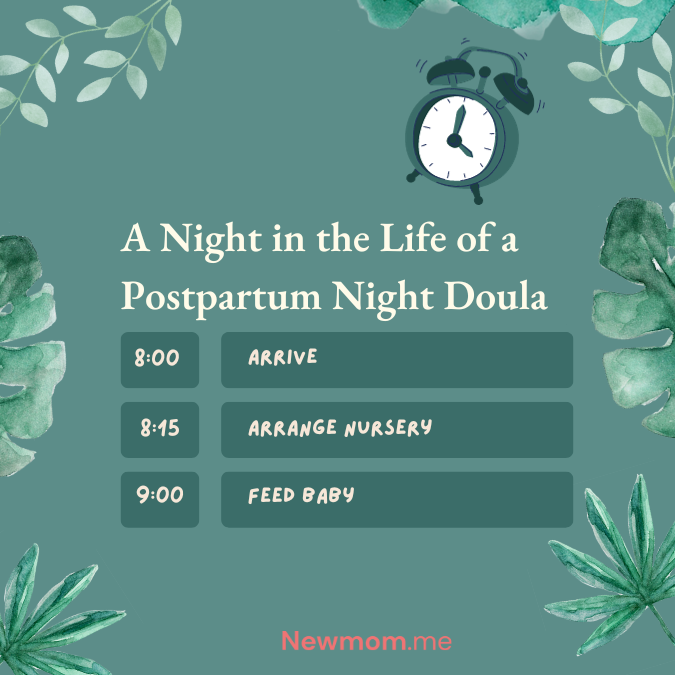Key Takeaways
• Night doulas provide overnight newborn care for parental rest
• Services include feeding, diaper changes, soothing, and breastfeeding support
• Doulas offer emotional support and educational guidance throughout shifts
The role of a postpartum night doula is both unique and crucial in supporting new parents through the often overwhelming early weeks with a newborn. If you’re considering hiring a night doula or are curious about what a typical shift entails, this blog post will give you a play-by-play of a night doula's responsibilities and what to expect when they step into your home.
Understanding the Role: A postpartum night doula provides education and support to parents and overnight care for the newborn, allowing parents, especially the birthing parent, to get a good night’s rest. Their responsibilities can include parent education, emotional support, light household tasks, feeding, changing, and soothing the baby, as well as offering breastfeeding support and guidance on infant care.
The Play-by-Play of a Night Doula's Shift:
1. Arrival and Check-In:
- Evening Greeting: The doula arrives with a calm presence, ready to bring peace and reassurance. The night typically starts with a brief check-in:
- How was the day?
- How is baby feeding?
- Are there any concerns from the parents?
- Setting Up: The doula sets up their station with all necessary supplies – diapers, wipes, feeding equipment, and any special items the baby might need.
2. Feeding and Care of the Baby: Once the parents settle down for some much-needed sleep, the doula takes over:The doula keeps the room dim and the vibe peaceful, aiming to maintain a calm, quiet atmosphere that encourages rest for both baby and parents.
- Night Feedings: Depending on the parents’ preference and the baby’s needs, the doula either feeds the baby or brings them to the mother for breastfeeding.
- Soothing baby back to sleep after feeds
- Diaper Changes: Regular diaper checks and changes are performed to keep the baby comfortable and prevent rashes.
3. Soothing and Settling the Baby:
- Soothing Techniques: The doula uses various techniques like gentle rocking, soft singing, or swaddling to soothe the baby back to sleep after feedings.
- Monitoring Sleep: Ensuring the baby is sleeping safely, the doula keeps a watchful eye while resting between feedings.
4. Addressing Baby’s Needs:
- Colic or Discomfort: The doula handles any issues of colic, gas, or general discomfort, applying appropriate techniques to comfort the baby.
- Quiet and Calm: Keeping the environment peaceful and quiet is a priority, using soft lights and minimal disturbance to maintain a sleep-conducive atmosphere.
5. Education Along the Way: Even at night, doulas play an important educational role. Whether during a middle-of-the-night feeding or early-morning chat, a postpartum doula can offer. This is education rooted in empathy—not judgment. It’s about empowering parents to feel more confident, not overwhelmed.
- Tips on safe sleep practices
- Breastfeeding guidance and latch help
- Newborn behavior and development insights
- Support for understanding baby’s cues and cries
5. Breastfeeding Support:
- Assistance: For breastfeeding mothers, the doula can assist with latching and positioning, especially during nighttime feedings.
- Pumping Support: If the mother is pumping, the doula helps with setting up the pump, storing milk, and cleaning equipment.
6. Emotional Support for Parents: The early weeks of parenthood can be emotionally intense. A doula is trained to offer non-judgmental support during this transition, especially at night when emotions can feel more amplified:
- Listening to fears or frustrations
- Normalizing the struggles of sleep deprivation
- Reassuring new parents that they’re doing a great job
6. Record Keeping:
- Logging Activities: The doula maintains a log of feeding times, diaper changes, and any other notable observations to inform the parents in the morning.
7. Transition to Morning:
- Morning Handoff: As the morning approaches, the doula prepares for the parents to take over, briefing them on the night’s events and any concerns or recommendations.
- Tidying Up: Cleaning and organizing the baby’s area and any used equipment is part of the doula’s morning routine.
8. Departure:
- Quiet Exit: The doula leaves quietly, ensuring minimal disruption to the family’s morning routine.
A postpartum night doula can be a lifeline for new parents, providing not just care for the baby but also peace of mind and valuable rest. By understanding the play-by-play of what a night doula does, parents can feel more comfortable and prepared for this support. Whether it’s feeding, diaper changing, or just offering a reassuring presence, a night doula’s role is all about nurturing the family during those crucial nighttime hours.
At Newmom.me, we’re here to transform the motherhood narrative and make this process of finding support so much easier on you. We have a carefully curated, easy-to-use, and customizable platform where you can search by the type of service you need, location, and availability. You can easily sign up to review profiles of Lactation Consultants, Doulas, Mother’s helpers, and other services. Let us help you embrace motherhood with a full heart.





-9.png)
-8.png)
-7.png)